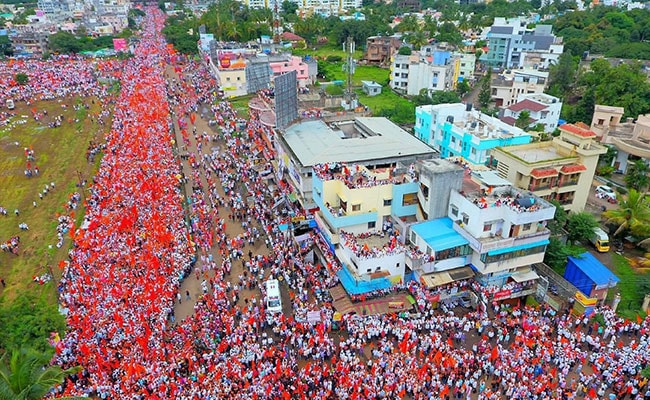
Political observers believe that all parties may feel the heat of the Maratha campaign in the state
Mumbai:
The ensuing elections to municipal councils and nagar panchayats across Maharashtra will be a major test for the two-year-old Devendra Fadnavis government, in the backdrop of caste polarisation triggered by campaigns of different communities, including influential Marathas in pursuance of their various demands.
Political observers are of the view that all parties may feel the heat of the Maratha campaign, pressing for reservations in jobs and education, and the counter movements by Dalits, OBCs and Muslims in the state.
Even though these campaigns have so far refrained from targeting each other, undercurrents of caste tensions have been palpable, they point out.
Some of them feel that the BJP-led government has not taken these morchas seriously and made efforts to defuse the caste tensions slowly building up.
There is a distinct possibility that voters around the state, especially in rural areas, will take the civic polls as a referendum on the performance of the Fadnavis regime, they said.
Law and order issue, spurt in crime against women and farmers' distress and suicides are also to figure prominently in the elections, they said.
The government is yet to declare Minimum Support Price for soyabean, cotton, paddy, sugarcane and has not taken a decision on starting procurement centres, they observed.
While ruling partners BJP and Shiv Sena have struck a deal to contest the polls together, the Congress and NCP, who control majority of municipal bodies, have left the decision of alliance to their local leadership.
NCP has 1,300 seats while Congress 1,293. BJP has 437, Sena 454 and MNS 61. There are over 400 independents as well.
Dismissing suggestion that the Maratha campaign could hit the BJP, party spokesman Madhav Bhandari said Congress and NCP are to be blamed for the caste polarisation.
"Maratha leadership of both these parties have ruled the state throughout. They did nothing for uplift of the community. It is only after Devendra Fadnavis became CM, the community feels it is backward," he said.
"If large morchas are taken out by the dominant community, naturally the non-Marathas will get insecure and the marches organised by them are a result of this insecurity," Mr Bhandari said.
Political observers are of the view that all parties may feel the heat of the Maratha campaign, pressing for reservations in jobs and education, and the counter movements by Dalits, OBCs and Muslims in the state.
Even though these campaigns have so far refrained from targeting each other, undercurrents of caste tensions have been palpable, they point out.
Some of them feel that the BJP-led government has not taken these morchas seriously and made efforts to defuse the caste tensions slowly building up.
There is a distinct possibility that voters around the state, especially in rural areas, will take the civic polls as a referendum on the performance of the Fadnavis regime, they said.
Law and order issue, spurt in crime against women and farmers' distress and suicides are also to figure prominently in the elections, they said.
The government is yet to declare Minimum Support Price for soyabean, cotton, paddy, sugarcane and has not taken a decision on starting procurement centres, they observed.
While ruling partners BJP and Shiv Sena have struck a deal to contest the polls together, the Congress and NCP, who control majority of municipal bodies, have left the decision of alliance to their local leadership.
NCP has 1,300 seats while Congress 1,293. BJP has 437, Sena 454 and MNS 61. There are over 400 independents as well.
Dismissing suggestion that the Maratha campaign could hit the BJP, party spokesman Madhav Bhandari said Congress and NCP are to be blamed for the caste polarisation.
"Maratha leadership of both these parties have ruled the state throughout. They did nothing for uplift of the community. It is only after Devendra Fadnavis became CM, the community feels it is backward," he said.
"If large morchas are taken out by the dominant community, naturally the non-Marathas will get insecure and the marches organised by them are a result of this insecurity," Mr Bhandari said.
Track Latest News Live on NDTV.com and get news updates from India and around the world

